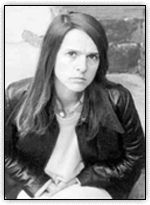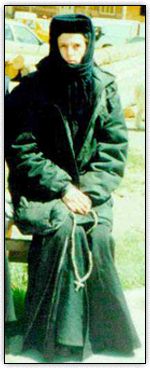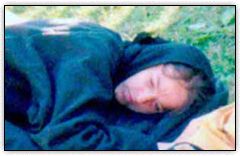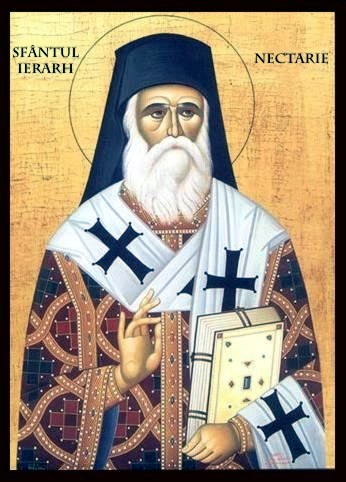| Christian religion is not a certain philosophic system, about which learned men, trained in metaphysical studies, argue and then either espouse or reject, according to the opinion each one has formed. It is faith, established in the souls of men, which ought to be spread to the many and be maintained in their consciousnesses. |
There are truths in Christianity that are above out intellectual comprehension, incapable of being grasped by the finite mind of man. Our intellect takes cognizance of them, becomes convinced of their reality, and testifies about their supernatural existence. Christianity is a religion of revelation. The Divine reveals its glory only to those who have been perfected through virtue. Christianity teaches perfection through virtue and demands that its followers become holy and perfect. It disapproves of and opposes those who are under the influence of the imagination. He who is truly perfect in virtue becomes through Divine help outside the flesh and the world, and truly enters another, spiritual world; not, however, through the imagination, but through the effulgence of Divine grace. Without grace, without revelation, no man, even the most virtuous, can transcend the flesh and the world. God reveals Himself to the humble, who live in accordance with virtue. Those who take up the wings of the imgination attempt the flight of Ikaros and have same end. Those who harbor fantasies do not pray; for he that prays lifts his mind and heart towrds God, whereas he that turns to fantasies diverts himself. Those who are addicted to the imagination have withdrawn from God's grace and from the realm of Divine revelation. They have abandoned the heart in which grace is revealed and have surrendered themselves to the imagination, which is devoid of all grace. It is only the heart that receives knowledge about things that are not apprehended by the senses, because God, Who dwells and moves within it, speaks within it and reveals to it the substance of things hoped for. SEEK GOD daily. But seek Him in your heart, not outside it. And when you find Him, stand with fear and trembling, like the Cherubim and the Seraphim, for your heart has become a throne of God. But in order to find God, become humble as dust before the Lord, for the Lord abhors the proud, whereas He visits those that are humble in heart, wherefor He says: "To whom will I look, but to him that is meek and humble in heart?" THE DIVINE LIGHT illumines the pure heart and the pure intellect, because these are susceptible to receiving light; whereas impure hearts and intellects, not being susceptible to receiving illumination, have an aversion to the light of knowledge, the light of truth; they like darkness... God loves those who have a pure heart, listens to their prayers, grants them their requests that lead to salvation, reveals Himself to them and teaches the mysteries of the Divine nature.
| The term CHURCH, according to the strict Orthodox view, has two meanings, one of them expressing its doctrinal and religious character, that is, its inner, peculiarly spiritual essence, and the other expressing its external character. Thus, according to the Orthodox confession, the Church is defined in a twofold manner: as a religious institution, and as a religious community (koinonia). |
The definition of the CHURCH as a religious institution may be formulated thus: The Church is a divine religious institution of the New Testament, built by our Savior Jesus Christ through His incarnate Dispensation, established upon faith on the day of holy Pentecost by the descent of the All-Holy Spirit upon the holy Disciples and Apostles of the Savior Christ, whom He rendered instruments of Divine grace for the perpetuation of His work of redemption. In this institution is entrusted the totality of revealed truths; in it operates Divine grace through the Mysteries; in it are regenerated those, who with faith, approach Christ the Savior; in it has been preserved both the written and the unwritten Apostolic teaching and tradition. The definition of the CHURCH as a religious community may be formulated thus: The CHURCH is a society of men united in the unity of the Spirit, in the bond of peace. The right view of the CHURCH is that the CHURCH is distinguished into the Militant and the Triumphant; and that it is Militant so long as it struggles against wickedness for the prevalence of the good, the Triumphant in the heavens, where there dwells the choir of the Righteous, who struggled and were made perfect in the faith in God and in virtue.
| Sacred TRADITION is the very CHURCH; without the Sacred TRADITION the CHURCH does not exist. Those who deny the Sacred TRADITON deny the Church and the preaching of the Apostles. |
| Before the writing of the Holy Scriptures, that is, of the sacred texts of the Gospels, the Acts and the Epistles of the Apostles, and before they were spread to the churches of the world, the CHURCH was based on Sacred Tradition....The holy texts are in relation to Sacred Tradition what the part is to the whole. |
| The CHURCH Fathers regard Sacred Tradition as the safe guide in the interpretation of Holy Scripture and absolutely necessary for understanding the truths contained in the Holy Scripture. The CHURCH received many traditions from the Apostles... The constitution of the church services, especially of the Divine Liturgy, the holy Mysteria themselves and the manner of performing them, certain prayers and other institutions of the Church go back to the Sacred Tradition of the Apostles. |
| In their conferences, the Holy Synods draw not only from Holy Scriptures, but also from Sacred Tradition as from a pure fount. Thus, the Seventh Ecumenical Synod says in the 8th Decree: "If one violates any part of the CHURCH Tradition, either written or unwritten, let him be anathema." |
| It is evident that unbelief is an evil offspring of an evil heart; for the guileless and pure heart everywhere discovers God, everywhere discerns Him, and always unhesitatingly believes in His existence. When the man of pure heart looks at the World of Nature, that is, at the sky, the earth, and the sea and at all things in them, and observes the systems constituting them, the infinite multitude of stars of heaven, the innumerable multitudes of birds and quadrupeds and every kind of animal of the earth, the variety of plants on it, the abundance of fish in the sea, he is immediately amazed and exclaims with the Prophet David: "How great are Thy works, O Lord! In wisdom Thou made them all." Such a man, impelled by his pure heart, discovers God also in the World of Grace of the Church, from which the evil man is far removed. The man of pure heart believes in the Church, admires her spiritual system, discovers God in the Mysteria, in the heights of the theology, in the light of the Divine revelations, in the truths of the teachings, in the commandments of the Law, in the achievements of the Saints, in the very good deed, in every perfect gift, and in general in the whole of the creation. Justly then did the Lord say in His Beatitudes of those possessing purity of the heart: "Blessed are the pure in heart, for they shall see God." |
| He who does not know himself does not know God, either. And he who does not know God does not know the truth and the nature of things in general... He who does not know himself continually sins against God and continually moves farther away from Him. He who does not know the nature of things and what they truly are in themselves is powerless to evaluate them according to their worth and to discriminate between the mean and the precious, the worthless and the valuable. Wherefore, such a person wears himself out in the pursuit of vain and trivial things, and is unconcerned about and indifferent to the things that are eternal and most precious. |
Man ought to will to know himself, to know God, and to understand the nature of things as they are in themselves, and this becomes an image and likeness of God.
| Man is a composite being, made up of an earthly body and celestial soul... The soul is closely united with the body, yet wholly independent of it. |
Man is not only reason but also heart. The powers of these two centers, mutually assisting one another, render man perfect and teach him what he could never learn through reason alone. If reason teaches about the natural world, the heart teaches us about the supernatural world... Man is perfect when he has developed both his heart and his intellect. Now the heart is developed through revealed religion
| The rational soul of man has supernatural, infinite aspirations. If the rational soul were dependent upon the body and died together with the body, it should necessarily submit to the body and follow it in all its appetites. Independence would have been contrary both to the laws of nature and to reason, because it disturbs the harmony between the body and the soul. As dependent upon the body it should submit to the body and follow in all its appetites and desires, whereas, on the contrary, the soul masters the body, imposes its will upon the body. The soul subjugates and curbs the appetites and passions of the body, and directs them as it (the soul) wills. This phenomenon comes to the attention of every rational man; and whoever is conscious of his own rational soul is conscious of the souls's mastery over the body. |
The mastery of the soul over the body is proved by the obedience of the body when it is being led with self-denial to sacrifice for the sake of the abstract ideas of the soul. The domination by the soul for prevalence of its principles, ideas, and views would have been entirely incomprehensible if the soul died together with the body. But a mortal soul would never have risen to such a height, would never have condemned itself to death along with the body for the prevalence of abstract ideas that lacked meaning, since no noble idea, no noble and courageous thought has any meaning for a mortal soul. A soul, therefore, which is capable of such things,must be immortal.
| The Teachers of the Eastern Orthodox Church, having Holy Scripture as their foundation, teach that those who die in the Lord go to a place of rest, according to the statement in the Apocalypse: "Blessed are the dead who die in the Lord from henceforth. Yea, saith the Spirit, that they may rest from their labors; and their works do follow them" (Revelation 14:13). This place of rest is viewed as spiritual Paradise, where the souls of those who have died in the Lord, the souls of the righteous, enjoy the blessings of rest, while awaiting the day of rewarding and the prize of the high calling of God in Christ Jesus... |
About the sinners, they teach that their souls go down to Hades, where there is suffering, sorrow, and groaning, awaiting the dreadful day of the Judgment. The Fathers of the Orthodox Church do not admit the existence of another place, intermediate between Paradise and Hades, as such a place is not mentioned in Holy Scripture. After the end of the General Judgment, the Righteous Judge (God) will declare the decision both to the righteous and to the sinners. To the righteous He will say: "Come, ye blessed of my Father, inherit the Kingdom prepared for you from the foundation of the world;" while to the sinners He will say: "Depart from me, ye cursed, into everlasting fire, prepared for the devil and his angels." And these will go away to enternal hades, while the righteous will go to enternal life. This retribution after the General Judgment will be complete, final, and definitive. It will complete, because it is not the soul alone, as the Partial Judgment of man after death, but the soul together with the body, that will receive what is deserved. It will be final, because it will be enduring and not temporary like that at Partial Judgment. And it will be definitive, because both for the righteous and for the sinners it will be unalterable and eternal.
| Our Church honors saints not as gods, but as faithful servants, as holy men and friends of God. It extols the struggles they engaged in and the deeds they performed for the glory of God with the action of His grace, in such a way that all the honor that the Church gives them refers to the Supreme Being, Who has viewed their life on earth with gratification. The Church honors them by commemorating them annually through public celebrations and through the erection of Churches in honor of their name. |
The holy men of God, who were magnified on earth by the Lord, have been honored by God's holy Church from the very time it was founded by the Savior Christ.
| Two factors are involved in man's salvation: the grace of God and the will of man. Both must work together, if salvation is to be attained. |
Repentance is a Mysterion through which he who repents for his sins confesses before a Spiritual Father who has been appointed by the Church and has received the authority to forgive sins, and receives from this Spiritual Father the remission of his sins and is reconciled with the Deity, against Whom he sinned. Repentance signifies regret, change of mind. The distinguishing marks of repentance are contrition, tears, aversion towards sin, and love of the good.
| We ought to do everything we can for the acquisition of virtue and moral wisdom (phronesis), for the prize is beautiful and the hope great. |
The path of virtue is a path of effort and toil: "Straight is the gate, and narrow is the way, leadeth unto life, and few there be that find it;" whereas the gate of vice is wide and the way spacious, but lead to perdition.
| Spiritual training (pneumatike gymnasia) is askesis for peity. It is most valuable, "having promise for the life that now is, and for that which is to come." The efforts made for the sake of piety bring spiritual gladness. |
Theophylaktos says: "Train yourself for piety, that is, for pure faith and the right life. Training, then, and continual efforts are necessary; for he who trains exercises until he perspires, even when there is no contest." Training accustoms one to be lenient, temperate, capable of controlling his anger, subduing his desires, doing works of charity, showing love for his fellow men, practicing virtue. Training is virtuous askesis, rendering one's way of life admirable. Askesis is practice, meditation, training, self-control, love of labor.
| Fasting is an ordinance of the Church, obliging the Christian to observe it on sepecific days. Concerning fasting, our Savior teaches: "When thou fastest, anoint thine head, and wash thy face; that thou appear not unto men to fast, but unto thy Father Who is in secret: and thy Father, Who seeth in secret, shall reward thee openly." From what the Savior teaches we learn (a) that fasting is pleasing to God, and (b) that he who fasts for the uplifting of his mind and heart towards God shall be rewarded by God, Who is a most liberal bestower of Divine gifts, for his devotion. |
In the New Testament fasting is recommended as a means of preparing the mind and the heart for divine worship, for long prayer, for rising from the earthly, and for spiritualization.
| ATTENTION is the first teacher of truth and consequently absolutely necessary. Attention rouses the soul to study itself and its longings, to learn their true character and repulse those that are unholy. Attention is the guardian angel of the intellect, always counseling it this : be attentive. Attention awakens the soul, rouses it from sleep... Attention examines every thought, every desire, every memory. Thoughts, desires, and memories are engendered by various causes, and often appear masked and with splendid garb, in order to deceive the inattentive intellect and enter into the soul and dominate it. Only attention can reveal their hidden form. Often their dissimulation is so perfect that the discerrnment of their true nature is very difficult and requires the greatest attention. One must remember the saving words of the Lord: "Be wakeful and pray that ye enter not into temptation." He who is wakeful does not enter into temptation, because he is vigilant and attentive. |
| TRUE PRAYER is undistracted, prolonged, performed with a contrite heart an alert intellect. The vehicle of prayer is everywhere humility, and prayer is a manifestation of humility. For being conscious of our own weakness, we invoke the power of GOD. |
PRAYER unites one with GOD, being a divine conversation and spiritual communion with the Being that is most beautiful and highest.
PRAYER IS FORGETTING EARTHLY THINGS, |
PRAYER is truly a heavenly armor, and is alone can keep safe those who have dedicated themselves to God. Prayer is the common medicine for purifying ourselves from the passions, for hindering sin and curing our faults. Prayer is an inexhaustible treasure, an unruffled harbor, the foundation of serenity,the root and mother of myriads of blessings.
| The MYSTERION of the Divine Eucharist that has been handed down by the Lord is the hightest of all the MYSTERIA; it is the most wondrous of all the miracles which the power of God has performed; it is the highest which the wisdom of God has conceived; it is the most precious of all the gifts which the love of God has bestowed upon men. For all the other miracles result through a transcendence of certain laws of Nature, but the MYSTERION of the DIVINE EUCHARIST transcends all these laws. Hence it may justly be called, and be viewed as, the miracle of miracles and the MYSTERION of MYSTERIA. |
DO YOU WANT TO BECOME A PARTAKER |
OF THE BLESSINGS CONFERRED |
DO YOU WANT YOUR SALVATION? |
FAITH IN THE MYSTERION OF DIVINE COMMUNION, |
| MIRACLES are not impossible from a logical standpoint, and right reason does not deny them. Natural laws do not have the claim to be the only ones, nor are they threatened with being overturned by the appearance of other laws, supernatural ones, which also are conducive to the development and furtherance of creation... Miracles are consequence of the Creator's love for his creatures. |
Source: "Modern Orthodox Saints, St. Nectarios of Aegina", by (Dr.) Constantine Cavarnos, Insititute for Byzantine and Modern Greek Studies, Belmont, Massachusetts., 1981., pp. 154-187.
| A Brief Life Of Saint NECTARIOS |
| Metropolitan Of Pentapolis, |

t. Nectarios, earthly name was Anastasios, as he was called, was from a very poor family in nineteenth century Selybria, in Thrace. He attempted to board a ship to Constantinople to find work, but he had no money for a ticket. The engines of the ship roared, yet it would not move until young Anastasios was permitted aboard. En route, the sea once raged, but Anastasios dipped his cross, which contained a piece of the True Cross, into the water three times, praying "Silence! Be still." The waters became still, but he lost his cross. As the ship continued, a loud continuous knocking was heard from beneath the ship. When they arrived at their destination, the sailors found the cross stuck to the bottom of the ship, as if the holy Cross of our Lord led the ship... When he was 29 years of age, he became a monk on the island of Chios. The patriarch sent him to study theology in Athens, and he was ordained Priest Nektarios (when you become a monk your name is changed), and later the Bishop of Pentapolis. |
However, owing to jealousy and alleged improprieties, he was removed from office, only to be rejected again in Athens and island of Euboiea. He suffered as a pauper, but he persevered, and his integrity and his wisdom shone through. The people of Euboiea embraced him. He became the Dean of the School of Theology in Athens in 1910 and helped begin a convent and became a spiritual father with healing powers for many throughout Greece. Ten years later, he was taken from Aegina to a hospital ward in Athens for the poor and incurable. He gave up his spirit there, and they prepared him for burial. His sweater was placed on the nearby bed of a paralytic, who suddenly regained his strength and walked. The room, which has since become a chapel, was filled with a beautiful fragrance for many days after his repose in the Lord our God. Healings are seen throughout the world to this day by the saint's holy prayers. He is considered the patron saint of those with cancer, heart trouble, arthritis, for those who are seeking a job, and epilepsy. St. Nectarios lived from 1846 until 1920. On November 9th, (1920) St. Nectarios reposed in the Lord. The Feast day for St. Nectarios is 9 November. Professor John E. Rexine, of Colgate University wrote the following: "Widely known among the Orthodox as a great miracle-worker, particularly as a healer of every sort of disease, St. Nectarios was a many-sided personality. He was a prolific writer, theologian, philosopher, moralist, educator, poet, ascetic and mystic." The above source on the lifeSaint Nectarios is from "THE ORTHODOX CALENDAR," Copyright 1995
HOLY SAINT NECTARIOS, PRAY UNTO GOD FOR US! |
|



























